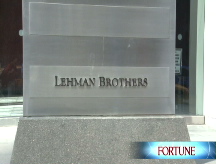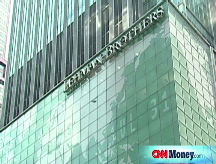The chicken game over Lehman
After propping up the financial system for more than a year, the government seems to be drawing the line - and for good reason.

NEW YORK (Fortune) -- A crew of top federal officials has spent the past year racing from one fire to the next in a harried effort to smother financial blazes that keep inflaming the markets and threatening the rest of the economy.
But after disgorging billions in taxpayer funds and effectively taking over three big companies, the emergency response team has apparently changed its tactics when it comes to Lehman Brothers (LEH, Fortune 500).
Just a week after they effectively nationalized mortgage giants Fannie Mae (FNM, Fortune 500) and Freddie Mac (FRE, Fortune 500), and six months after they financed a hasty takeover of Bear Stearns, the Federal Reserve and Treasury are delivering Wall Street a different message: you'll have to learn to save yourselves.
In meetings that began on Friday and were scheduled to continue today, officials led by Federal Reserve Bank of New York President Timothy Geithner and Treasury Secretary Henry Paulson are said to be pushing top banking executives to hammer out a Lehman solution that doesn't depend on access to the public purse.
The fate of Lehman, wracked by huge losses in a portfolio laden with real estate and mortgage-backed securities, is now in hands of the bosses of healthier institutions such as Bank of America (BAC, Fortune 500), Barclays (BCS) and JPMorgan Chase (JPM, Fortune 500), which were called in to chat with regulators, and the private equity firms such as Bain Capital that have submitted bids for parts of the bank.
And that, market observers say, is as it should be.
Policymakers "came in for a lot of criticism after Bear," says David Merkel, chief economist at Finacorp Securities. "I think they learned some lessons there."
It's still possible, of course, that would-be buyers for all or pieces of Lehman will wrest concessions from officials anxious to avoid a market meltdown. But it also seems that, as Merkel says, policymakers have come to a couple of realizations about their earlier interventions.
One oft-cited critique of the Bear Stearns case is that any government rescue of private investors creates so-called moral hazard by encouraging greater risk-taking on the assumption further bailouts will be coming.
Leaving Lehman to a private fire sale could help insulate policymakers from the criticism that they're willing to socialize losses by big institutions while subjecting individuals who make poor investment decisions to the relentless discipline of the markets.
But the government's desire to step aside from Lehman also reflects the failure of recent interventions to provide the market stability Paulson has enunciated as one of his aims.
While the Treasury Secretary took over Fannie and Freddie last Sunday to show investors the companies wouldn't default on their debt, Wall Street responded not with a sigh of relief but with a vicious run on other struggling financial firms that might need to raise new capital.
Lehman got the worst of it, with its stock losing three quarters of its value last week. But it was hardly alone.
Insurer AIG (AIG, Fortune 500), beset by tens of billions of losses on promises to stand behind troubled mortgage debt, lost 30% of its value on Friday alone and almost half its market capitalization over the course of the week, prompting the company to schedule a Monday morning call to address analysts and investors.
Washington Mutual (WM, Fortune 500), the Seattle thrift that was one of the biggest producers of adjustable-rate mortgages during the housing bubble that popped earlier this decade, dropped to a low last seen in 1991 before the company put out a release insisting it had enough money to make it through the bust.
Shares in another serial mortgage loser and capital raiser, Merrill Lynch (MER, Fortune 500), dropped sharply as well. If Lehman is sold, dismembered or otherwise relieved of its independence, Merrill would be the smallest of the remaining independent Wall Street firms. It must be chilling indeed for Merrill execs to note that before Lehman, that distinction was held by Bear Stearns.
If the Lehman case shows federal officials are eager to let the markets sort this mess out for themselves, the past week's plunge of AIG, WaMu and Merrill suggests that healthier financial institutions and cash-flush private equity firms may soon have no shortage of attractive assets to bid on, as the firms seek to sell off parts to stay afloat.
As for Lehman, Wall Street had been expecting for more than a month that the firm would raise capital via the sale of subsidiaries or perhaps a minority stake in the 158-year-old firm itself. But longtime CEO Dick Fuld failed to strike a deal when Lehman seemed to have some options, in the apparent belief that better prices were to be had.
Now, in the wake of the collapse of the company's stock price to levels of a decade ago and the threat of downgrades by big ratings agencies, Fuld has little choice but to accept whatever deal or deals the government can broker-or face a withdrawal by trading partners that could leave Lehman insolvent.
In the Bear case, the Fed, worried about a potential calamity in the markets as the investment bank collapsed in a manner of days, agreed to provide financing for a JPMorgan Chase takeover. The arrangement exposes taxpayers to potential losses of as much as $29 billion, though it's worth noting that no such losses have yet been taken.
Potential buyers of Lehman shouldn't expect similar treatment. But it's nonetheless possible that bidders will try to play the government off against its fears of financial system unrest should key parts of Lehman such as its derivatives holdings go unclaimed.
The Fed-sponsored gathering of industry officials may reduce the chance of such a calamity. But in the event of a complication, Merkel says, officials could always try quelling fears of a meltdown by taking responsibility for the derivatives book, and then letting the rest of Lehman fail. ![]()
-
 The retail giant tops the Fortune 500 for the second year in a row. Who else made the list? More
The retail giant tops the Fortune 500 for the second year in a row. Who else made the list? More -
 This group of companies is all about social networking to connect with their customers. More
This group of companies is all about social networking to connect with their customers. More -
 The fight over the cholesterol medication is keeping a generic version from hitting the market. More
The fight over the cholesterol medication is keeping a generic version from hitting the market. More -
 Bin Laden may be dead, but the terrorist group he led doesn't need his money. More
Bin Laden may be dead, but the terrorist group he led doesn't need his money. More -
 U.S. real estate might be a mess, but in other parts of the world, home prices are jumping. More
U.S. real estate might be a mess, but in other parts of the world, home prices are jumping. More -
 Libya's output is a fraction of global production, but it's crucial to the nation's economy. More
Libya's output is a fraction of global production, but it's crucial to the nation's economy. More -
 Once rates start to rise, things could get ugly fast for our neighbors to the north. More
Once rates start to rise, things could get ugly fast for our neighbors to the north. More









